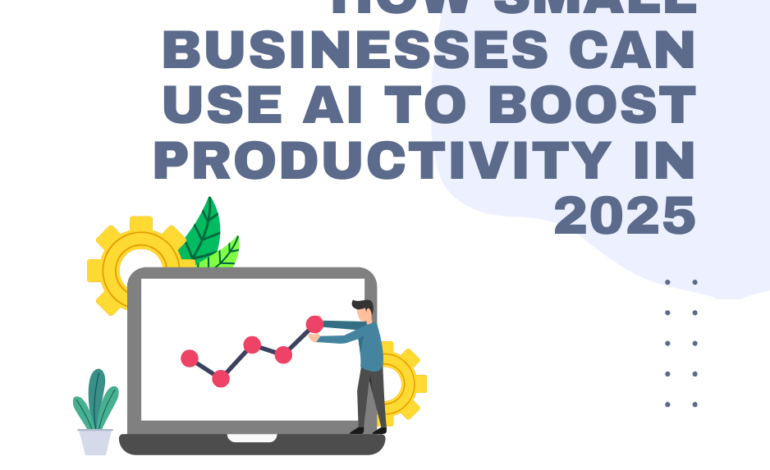How Small Businesses Can Use AI to Boost Productivity in 2025

In the rapidly evolving business landscape of 2025, small businesses are discovering innovative ways to enhance their operations and stay competitive. One of the most powerful tools transforming this space is AI for small businesses. From automating routine tasks to refining customer interactions, artificial intelligence is no longer a luxury reserved for large enterprises. Today, small businesses harness AI productivity tools to streamline workflows, reduce costs, and improve overall efficiency.
Integrating AI into marketing strategies has become a game changer. With the help of AI in marketing, small businesses can better understand their target audience, personalize campaigns, and optimize ad spend. Moreover, many entrepreneurs are exploring small business AI adoption as a means to gain a competitive edge in crowded markets. Notably, AI-driven customer service solutions help businesses offer round-the-clock support, enhancing customer satisfaction and loyalty.
This article will delve into practical ways small businesses can embrace AI, discuss its tangible benefits, and highlight the tools that can drive growth and success in 2025.
Understanding AI’s Role in Small Business Growth
Artificial intelligence has evolved far beyond complex algorithms and high-tech labs. Today’s AI for small businesses focuses on making intelligent automation accessible and affordable. Small enterprises can now deploy AI to handle inventory management, sales forecasting, and even human resources tasks with minimal upfront investment.
The rise of AI productivity tools means small business owners can automate repetitive work that previously consumed valuable time. These tools analyze data faster and more accurately than humans, freeing owners and employees to focus on strategic decision-making and customer engagement. This shift allows businesses to scale operations without proportionally increasing costs.
Furthermore, AI-driven insights have revolutionized how small businesses approach their markets. For instance, with AI in marketing, businesses gain access to predictive analytics that guide targeted advertising and content creation. This makes marketing efforts more effective and budget-friendly.
How Small Business AI Adoption Changes Daily Operations
The practical adoption of AI technologies varies widely but consistently yields improvements in operational efficiency. Small businesses implementing small business AI adoption strategies often start with chatbots or virtual assistants. These tools handle common customer inquiries, book appointments, or manage FAQs without human intervention, greatly enhancing response times and reducing overhead.
Another area where AI excels is in financial management. Businesses can automate invoicing, track expenses, and forecast cash flow with AI-powered accounting software. This reduces human errors and improves financial planning.
AI productivity tools also improve project management by monitoring deadlines, assigning tasks, and flagging bottlenecks. This ensures projects stay on track and team collaboration increases, even in remote or hybrid work environments.
Leveraging AI in Marketing for Better Reach and Engagement
Marketing is the frontline where small businesses directly connect with their customers. Using AI in marketing, businesses can analyze customer behavior and preferences in real time. This helps craft personalized messages that resonate and convert better.
AI platforms provide content recommendations, optimize email campaigns, and even schedule social media posts for maximum impact. As a result, businesses experience higher engagement rates and improved return on investment.
Moreover, AI tools enable predictive analytics that identify emerging trends and customer needs. This foresight empowers businesses to launch new products or services ahead of competitors, ensuring market relevance.
The Impact of AI Customer Service Tools on Client Satisfaction
Customer service remains a cornerstone of business success. AI-powered chatbots and virtual assistants are redefining client interactions by offering immediate, 24/7 support. These AI customer service tools can answer questions, resolve issues, and escalate complex cases to human agents efficiently.
By integrating these tools, small businesses reduce wait times and provide consistent, accurate information to customers. This leads to higher satisfaction and often, increased loyalty.
Furthermore, AI-driven sentiment analysis tools monitor customer feedback across platforms. This enables businesses to proactively address negative experiences and improve their services, building a positive brand reputation.
Choosing the Right AI Productivity Tools for Your Business
Selecting the most suitable AI productivity tools depends on your business size, industry, and specific needs. Some tools focus on marketing automation, while others excel at sales analytics or customer engagement.
It’s crucial to evaluate tools based on ease of use, integration capabilities, and cost-effectiveness. Many AI platforms offer free trials, allowing small businesses to test functionalities before committing.
Consider adopting AI tools that enhance collaboration, such as AI-powered project management software or document automation systems. These help teams work more efficiently and reduce administrative burdens.
Addressing Common Challenges in Small Business AI Adoption
Despite its benefits, small business AI adoption faces challenges such as lack of technical expertise, budget constraints, and data privacy concerns. Many small business owners hesitate to invest in AI due to uncertainty about ROI and the complexity of implementation.
To overcome these barriers, education and awareness are essential. Business owners should seek out resources, attend workshops, or partner with AI consultants to better understand AI applications.
Security is another critical aspect. Using AI tools that comply with data protection regulations helps maintain customer trust and avoid legal issues.
Real-Life Examples of AI Transforming Small Businesses
Across various industries, small businesses have reported significant gains by implementing AI for small businesses. Retailers use AI-powered inventory systems to predict demand and avoid overstocking, saving costs.
Service providers employ AI chatbots to manage appointments and provide instant support, increasing client satisfaction. Marketing agencies harness AI-driven analytics to optimize campaigns and improve client ROI.
These success stories demonstrate that AI is no longer a futuristic concept but a practical asset for everyday business operations.
Future Trends in AI for Small Business Productivity
Looking ahead, advancements in AI promise even more sophisticated tools tailored for small businesses. Emerging trends include the rise of generative AI for content creation and enhanced voice assistants for customer interaction.
Businesses investing early in these technologies will likely gain a strategic advantage. The key is to remain adaptable and continuously evaluate how AI can address evolving business needs.
Integrating AI Without Disrupting Your Workflow
One common fear among small businesses is that adopting AI will disrupt existing workflows. However, many AI productivity tools are designed for seamless integration.
Start small by automating simple tasks and gradually expand AI usage as your team gains confidence. Training employees on AI capabilities ensures smooth adoption and maximizes benefits.
Remember, AI should support human efforts, not replace them. A balanced approach fosters innovation while preserving essential human touchpoints.
Why Investing in AI Now Matters for Small Businesses
As competition intensifies, small businesses that embrace AI stand to gain the most. Using AI productivity tools helps reduce costs, increase revenue, and improve customer experiences.
Early adoption also positions businesses as innovators, attracting tech-savvy customers and potential partners. With many affordable AI solutions available today, the barriers to entry are lower than ever.
For small businesses ready to take the leap, the time to invest in AI is now.
How to Begin Your AI Journey
Starting your AI journey begins with identifying pain points where automation can deliver the greatest impact. Whether it’s marketing, customer service, or internal processes, pinpointing these areas guides effective tool selection.
Explore AI vendors that specialize in small business solutions. Many provide scalable products tailored to various budgets.
Consulting experts or leveraging online resources can ease the transition and ensure your AI implementation aligns with business goals.
Harnessing AI to Improve Cash Flow and Financial Management
Effective cash flow management is vital for any small business. AI tools equipped with predictive analytics help forecast sales trends and optimize expenses.
Automated invoicing and payment reminders reduce late payments and improve working capital. Integrating AI into accounting practices saves time and increases accuracy.
By enhancing financial oversight, businesses can make smarter investment decisions and maintain stability.
Using AI to Enhance Online Business Presence
In an increasingly digital world, small businesses must optimize their online presence. AI-powered SEO tools analyze website performance, identify keywords, and suggest content improvements.
With AI in marketing, companies can tailor digital campaigns to target specific audiences more effectively. This drives traffic, boosts conversions, and ultimately grows revenue.
Maintaining an active online presence through AI-managed social media tools also ensures continuous engagement with customers.
How AI Supports Business Continuity and Resilience
Unpredictable market conditions require small businesses to be agile. AI offers predictive insights that help anticipate disruptions and adapt strategies accordingly.
By analyzing data trends, AI tools can forecast supply chain issues or customer demand shifts, allowing businesses to respond proactively.
Investing in small business AI adoption thus builds resilience and safeguards operations against future uncertainties.
FAQs
AI productivity tools automate repetitive tasks, improving efficiency and freeing time for strategic work.
AI analyzes customer data to create personalized campaigns, increasing engagement and sales.
Many AI solutions are affordable and scalable, designed to fit small business budgets.
AI handles routine inquiries but complex issues still require human attention for best results.
Challenges include technical knowledge gaps, cost concerns, and data privacy issues.






